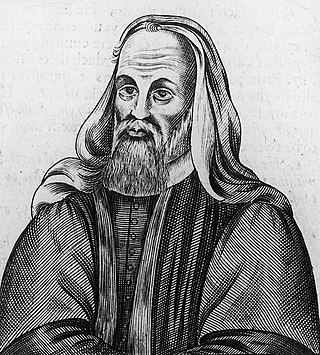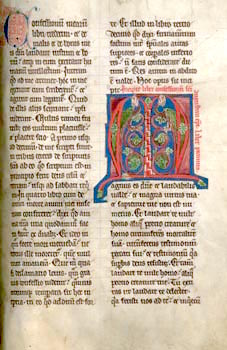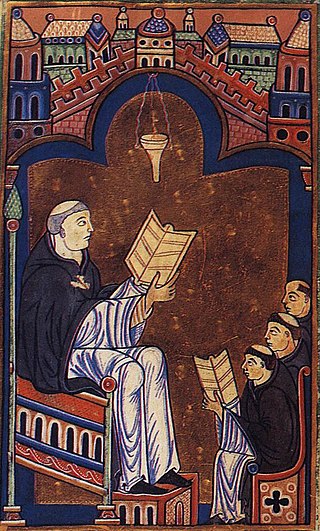Related Research Articles

Augustine of Hippo, also known as Saint Augustine, was a theologian and philosopher of Berber origin and the bishop of Hippo Regius in Numidia, Roman North Africa. His writings influenced the development of Western philosophy and Western Christianity, and he is viewed as one of the most important Church Fathers of the Latin Church in the Patristic Period. His many important works include The City of God, On Christian Doctrine, and Confessions.
Pelagianism is a Christian theological position that holds that the fall did not taint human nature and that humans by divine grace have free will to achieve human perfection. Pelagius, an ascetic and philosopher from the British Isles, taught that God could not command believers to do the impossible, and therefore it must be possible to satisfy all divine commandments. He also taught that it was unjust to punish one person for the sins of another; therefore, infants are born blameless. Pelagius accepted no excuse for sinful behaviour and taught that all Christians, regardless of their station in life, should live unimpeachable, sinless lives.

Pelagius was a British theologian known for promoting a system of doctrines which emphasized human choice in salvation and denied original sin. Pelagius was accused of heresy at the synod of Jerusalem in 415 and his doctrines were harshly criticized by Augustine of Hippo, especially the Pelagian views about mankind's good nature and individual responsibility for choosing asceticism. Pelagius especially stressed the freedom of human will. Very little is known about the personal life and career of Pelagius.

Giles of Rome O.S.A. was a medieval philosopher and Scholastic theologian and a friar of the Order of St Augustine, who was also appointed to the positions of prior general of his order and as Archbishop of Bourges. He is famed as being a logician, who produced a commentary on the Organon by Aristotle, and as the author of two important works: De ecclesiastica potestate, a major text of early-14th-century papalism, and De regimine principum, a guide book for Christian temporal leadership. Giles was styled Doctor Fundatissimus by Pope Benedict XIV.

Confessions is an autobiographical work by Augustine of Hippo, consisting of 13 books written in Latin between AD 397 and 400. The work outlines Augustine's sinful youth and his conversion to Christianity. Modern English translations of it are sometimes published under the title The Confessions of Saint Augustine in order to distinguish the book from other books with similar titles. Its original title was Confessions in Thirteen Books, and it was composed to be read out loud with each book being a complete unit.
Semi-Pelagianism is a historical Christian theological and soteriological school of thought about the role of free will in salvation. In semipelagian thought, a distinction is made between the beginning of faith and the increase of faith. Semi-Pelagian thought teaches that the latter half – growing in faith – is the work of God, while the beginning of faith is an act of free will, with grace supervening only later.
Henry of Ghent, also known as Henricus de Gandavo and Henricus Gandavensis, was a scholastic philosopher who acquired the nickname of Doctor Solemnis.

In religious studies, homiletics is the application of the general principles of rhetoric to the specific art of public preaching. One who practices or studies homiletics may be called a homilist, or more simply, a preacher.

Caesarius of Arles, sometimes called "of Chalon" from his birthplace Chalon-sur-Saône, was the foremost ecclesiastic of his generation in Merovingian Gaul. Caesarius is considered to be of the last generation of church leaders of Gaul who worked to integrate large-scale ascetic elements into the Western Christian tradition. William E. Klingshirn's study of Caesarius depicts Caesarius as having the reputation of a "popular preacher of great fervour and enduring influence". Among those who exercised the greatest influence on Caesarius were Augustine of Hippo, Julianus Pomerius, and John Cassian.

Hugh of Saint Victor was a Saxon canon regular and a leading theologian and writer on mystical theology.

Fabius Claudius Gordianus Fulgentius, also known as Fulgentius of Ruspe, was a North African Christian prelate who served as Bishop of Ruspe in what is now Tunisia, during the 5th and 6th century. He has been venerated as a saint.

Faustus of Riez was an early Bishop of Riez (Rhegium) in Southern Gaul (Provence), the best known and most distinguished defender of so-called Semipelagianism.

William of Auvergne, also known as William of Paris, was a French theologian and philosopher who served as Bishop of Paris from 1228 until his death. He was one of the first western European philosophers to engage with and comment extensively upon Aristotelian and Islamic philosophy.
The Synod of Milan or Council of Milan may refer to any of several synods which occurred in late Roman Mediolanum or medieval Milan in northern Italy's Po valley:

The bibliography of Augustine of Hippo contains a list of works published by fourth-century Christian bishop and theologian Augustine of Hippo.
The Second Council of Orange was held in 529 at Orange, which was then part of the Ostrogothic Kingdom. It affirmed much of the theology of Augustine of Hippo and synergism, and made numerous proclamations against what later would come to be known as semi-Pelagian doctrine.

Augustinianism is the philosophical and theological system of Augustine of Hippo and its subsequent development by other thinkers, notably Boethius, Anselm of Canterbury and Bonaventure. Among Augustine's most important works are The City of God, De doctrina Christiana, and Confessions.

Majorinus was the leader of a schismatic Christian sect in Roman North Africa known as the Donatists.
Augustinian soteriology, influenced by Augustine of Hippo early engagements with Stoicism, Neoplatonism, and Manichaeism, played a crucial role in shaping Christian theology. Initially opposing deterministic views, Augustine later integrated aspects of these philosophies, especially during his disputes with the Pelagians. His doctrines, such as predestination by predeterminism, laid the groundwork for later theological developments. Augustine's influence on John Calvin was particularly significant in shaping Calvinist soteriology and understanding of divine providence.

De Genesi ad litteram is an exegetical reading of the Book of Genesis written in Latin by Augustine of Hippo. Likely completed in AD 415, this work was Augustine's second attempt to literally interpret the Genesis narrative. De Genesi ad litteram is divided into 12 books and discusses the seven days of creation, the second creation narrative and the Garden of Eden story, and the "Third Heaven" mentioned in 2 Corinthians 12:2-4.
References
- ↑ WorldCat Identities
- ↑ "In Memoriam: Fr. Roland J. Teske, S.J." Jesuits Midwest. Retrieved 23 September 2015.
- ↑ WorldCat